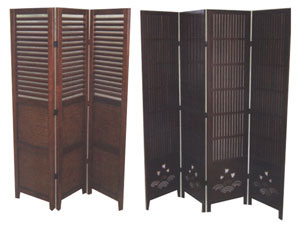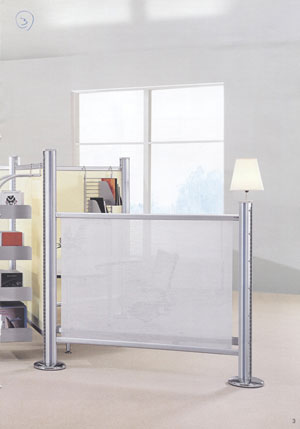Insider's Look at Niche Furniture Makers in Taiwan
2009/06/06 | By Judy Li
Loyal Screen Maker
Nan Ya Furniture Industry Co., Ltd. is one of the few in Taiwan still making foldable or Shoji screens, despite a waning market. "We're still in this segment for we still have a lot of long-term clients," says Chang Tsai-feng, a senior manager.
Established in 1961, Nan Ya is one of the pioneering manufacturers in Taiwan who have seen the cottage industries on the island evolve into sizable, modern businesses. Initially a maker of metal exercise equipment, Nan Ya diversified into furniture in the 1970s when Taiwan's manufacturers began to receive export orders. The 1970s and 1980s were heady periods of growths for all kinds of exports in Taiwan, such as umbrellas, toys, lamps, timepieces, shoes, garments etc., Chang recalls. Nan Ya was no exception as it began to turn out furniture in the late 1970s, focusing on wooden screens in addition to tables, closets, doors, and mirrors.
Despite years of successful operation in the 1980s, Nan Ya felt, to remain competitive, necessary to upgrade overall management and manufacturing. "Facing steep competition, we needed to emphasize R&D, upgrade manufacturing facilities, and retrain workers to enhance their capability," Chang says. "So we bought sophisticated machines and introduced advanced manufacturing technologies in the 1990s and established two more factories, even when many of our peers moved production offshore due to worsening manufacturing environment."
Vietnam-based Manufacturing
Nan Ya held out until 2002 when it finally set up a plant in Vietnam. "We could not resist the forces of globalization for such is the trend in manufacturing. Virtually all our production has been moved to Vietnam, while in Taiwan we handle only finances and order processing as well as small-volume production, which is done by less than 10 workers here," Chang says.
In contrast, the company's 100,000-square-meter factory in Vietnam has more than 400 workers. "Vietnam is our major production base in charge of all volume production and shipments," Chang adds.
Despite a shrinking market, Nan Ya still makes Shoji screens as a staple item. "Our screens are mostly made of pine imported from New Zealand to assure quality; so far the supply of such wood has been quite stable and price reasonable," Chang states.
"Our wooden screens have been popular both at home and abroad," Chang points out. "However, to stay in tune to changing tastes, we have in recent years developed screens made of composites in addition to wood, and these new models have helped us expand market niches."
Nan Ya distributes 20%-30% of its products in Taiwan and exports the remaining 70%-80% globally, mainly to Japan, the United States, Europe and Australia.

Rocky Start
Despite having over 20 years of experience, Tay Huah Furniture Corp., manufacturer of office and children's furniture, is still trying to consolidate its niche, only recently having begun to turn out modular wall systems and office partitions. "The company was established in 1984 and initially turned out mainly office chairs and tables," indicates Candy Chang, the general manager. "The booming market for children's furniture drew us into the segment in the early 1990s, but it took four years to turn red ink to black."
Buoyed by success in children's furniture, Tay Huah turned to reinforcing its office furniture line. After brainstorming with its R&D staff, the company decided to add modular wall systems and partitions to its office furniture range.
"To expand the production lines to make modular wall systems and office partition, we spent more than NT$2 million (US$60,606 at US$1 = NT$33) on new facilities and machines, not to mention more than a year in R&D," Chang reveals.
After tweaking repeatedly the molds, Tay Huah finally unveiled its office partitions in the first half of 2008 and started mass production in September of the same year. "To be sensitive to the global green movement, we use nontoxic, natural, recyclable, specially-treated fabric, wood, and metal to make the partitions," Chang emphasizes.
Deceptively Simple
"Although the design of wall systems and office partitions look simple, the fact is that as many as a thousand molds have to be built for the various hardware and parts," Chang points out. "We carried out several market surveys just to find that grays, dark blue, and natural wood colors are the most acceptable to consumers."
Backed by a workforce of more than 30 at its Chung Hua factory in central Taiwan, Tay Huah subcontracts most manufacturing to more than 80 satellite factories around the island. "Such manufacture outsourcing enables Tay Huah to mainly engage in R&D and develop molds for key or special parts," Chang adds. The modular office partitions are used mostly in offices, conference rooms and classrooms, enabling flexible set-up depending on individual size of room.
Tay Huah aims to distribute its modular wall systems and office partitions initially to the United States, Australia and the Middle East. "So far we have already received encouraging responses from a few buyers in the U.S. and Australia, as well as many inquiries from the Middle East. We are confident of achieving success in these markets," Chang says.

Husband & Wife Team
Human System Furniture Co., Ltd., established in 1991, by Steven Lin and Elen Huang, the like-minded couple who have built a career in design-oriented furniture seen as innovative trend-setters in the sector.
Having weathered the ups and downs of the industry, the couple has laid a solid foundation for the company, which offers a range of office tables, cabinets, computer desks as well as office partitions.
Lin and Huang are living-proof that a couple who can work together stays as team. "My husband takes care of R&D and manufacturing while I am in charge of marketing and order processing," Huang says. "We complement each other perfectly."
"Since day one, we have been committed to building aesthetic, multifunctional, and health-enhancing products that fully meet user demands," Huang notes. "We don't compromise on perfection, always ditching imperfect molds as necessary."
Investing some 70% of revenues in R&D reflects Human System's dedication to building top-quality, innovative products. The firm offers trendy, cutting-edge furniture made of various metals, glass, wood, cloth, and plastics. "It's the law of the jungle in the increasingly competitive global market," Huang remarks.
Although modular office partitions occupy relatively small product value among the company's wide-ranging office furniture line, Human System still spares little effort to create high-end, innovative partitions. "To meet different demands, we offer wide- ranging partitions in terms of design, color and size," Lin says.
Innovative Office Partitions
"Although office partitions are regarded as utilitarian items, we consistently try to innovate," Lin continues. "Departing from tradition, I created office partitions a couple years ago that do not divide work spaces into squares, instead the more relaxed hexagonal or beehive configuration lends a sense of nature to office settings."
Dubbed "New Base," this new partition system adopts screens of plain fabric, clear and opaque glass, frosted glass, or even translucent flax, with each able to color various offices with different moods.
The "New Base" system minimizes clutter in especially small offices: its ingeniously-designed multifunctional posts can double as raceways to hide electric wires, or be lengthened to ceiling height to run such cables inside ceilings; while computers and electronic devices can be hung on the posts, " Lin explains. "Moreover, the horizontal routing of cables under desktops is managed neatly in 'flyover' networks to achieve order."
Human System is not only a supplier of office furniture, but also a provider of office-setup solutions. Marketing both in Taiwan and abroad, the company is looking for agents to help expand its marketing channels.




